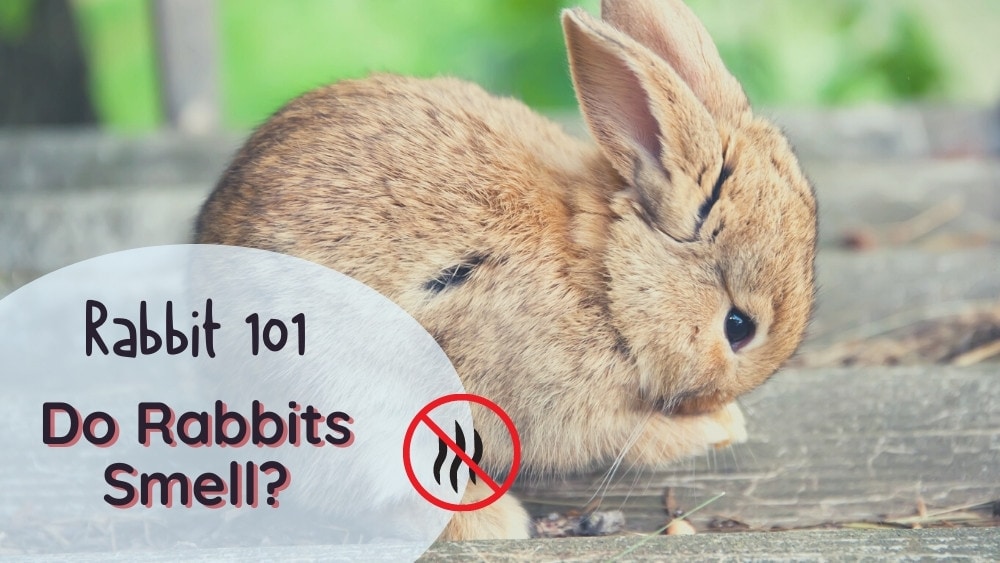First-time bunny owners often worry about whether a rabbit will make their home smell unpleasant. If you’re wondering, ‘do rabbits smell?’ the answer is no! Rabbits are relatively clean animals and groom themselves regularly, in a similar way to cats.
I’ve worked with rabbits and lived with them, and I have never had a problem with rabbits smelling unless there was a health issue. It’s possible to keep a rabbit indoors and keep your home smelling pleasant.
Of course, just like any other animal (humans included), you will encounter some smells.
This article will cover everything you need to know about rabbit odors and how to keep your home smelling nice!
Do Bunnies Smell?
Rabbits aren’t smelly animals by nature. They groom themselves daily to keep their body clean. They also tend to want to keep their living area reasonably clean.
You might come across some odors which we’ll discuss in this article.
Rabbit Odour Guide
Healthy rabbits don’t smell. They’re very clean animals, and you’ll see them spend lots of time grooming themselves daily.
You might be surprised to know that you don’t need to bathe rabbits unless they have a health issue.
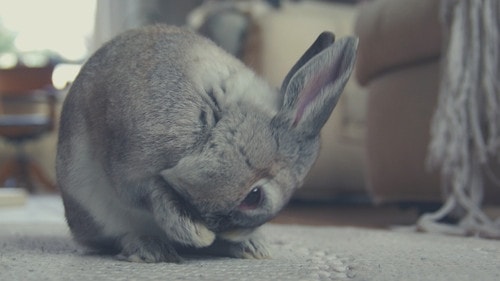
You will come across some odors as a bunny owner, which we will discuss in detail below. There are also some situations, such as ill health, which mean you’ll need to put in some extra work to help keep your bunny smelling fresh.
Does Rabbit Poop Smell?
Rabbits poop a lot. I mean, really, a lot! Thankfully, most of their poop doesn’t have a smell.
Healthy rabbit poop consists of small, hard, round pellets. You won’t smell these at all.
Rabbits also produce a type of poop called cecotropes. The Rabbit Welfare Association and Fund explain that cecotropes look a bit like a bunch of grapes. They look like tiny beads that are all joined together and covered in slime. Cecotropes contain partially digested food that rabbits eat to keep their digestive system functioning correctly.
I know it doesn’t sound pleasant, but it’s how your rabbit gets the nutrients they need from their food.
Cecotropes can be smelly, but you shouldn’t see them lying around unless something is wrong. Your bunny will eat them straight from their bottom as soon as they produce them, so you don’t usually need to worry about the smell!
Does Rabbit Pee Smell?
Unfortunately, yes, rabbit pee does have quite a strong smell. A bunny’s pee contains a lot of ammonia, which creates quite a stink.
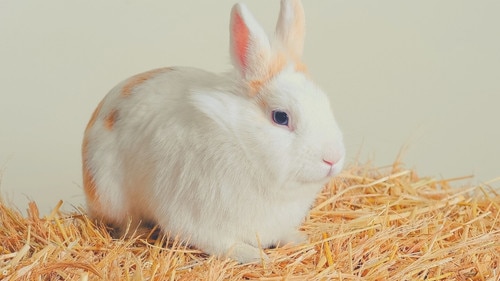
The good news is rabbits can be litter trained. As long as you use absorbent litter and clean their litter tray daily, the smell shouldn’t be bothersome!
Mating Season
Intact male rabbits simply means males who are not neutered. An intact male occasionally emits a strong musky smell to attract a mate. This is more common during mating season, around spring and summer.
It’s worth noting that rabbits mate all year round, but the warmer months are when they’re most fertile.
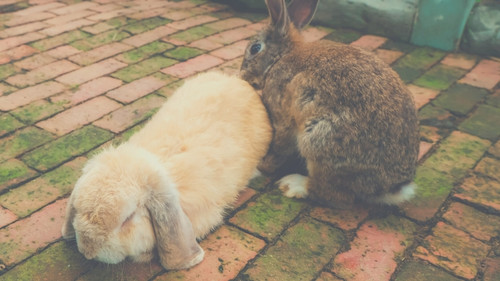
The smell a male rabbit gives off is powerful, and many owners describe it as ‘skunk-like.’ The best way to deal with this is by getting your rabbit neutered.
Neutering your rabbit is also better for their health and prevents unwanted pregnancies if you house them with a female.
Health Issues
Some health issues can cause your rabbit to smell. This might be because they can’t clean themselves, or the illness may be the source of the odor.
The main health problems which can cause a stink are described below.
Diarrhea
If your rabbit has diarrhea, it can be extremely smelly. Soft, runny poops are not normal for a rabbit and are a sign of underlying health issues.
There are many potential causes of diarrhea, including an infection, parasites, a poor diet, liver disease, or dental disease.

Regardless of the cause, it’s very serious for bunnies. If you notice your rabbit has diarrhea, take them to the vet as soon as possible. Once they recover, their poops won’t smell anymore.
Mobility Issues
Just like humans, some rabbits are disabled and struggle with mobility. They might have arthritis, joint pain, or stiffness.
Disabled bunnies can struggle to clean themselves, so their back end can get quite dirty. Elderly rabbits can also struggle with this.
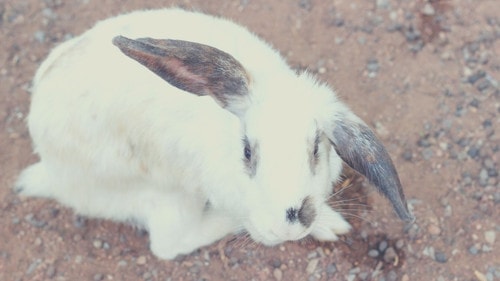
This can make them quite smelly and is unhygienic for them. Therefore, it’s important you help them to stay clean. Your vet can guide you on how best to do this.
My rabbit Hopkins was over 11 years old when he passed away. As he reached his last year of life, he struggled with keeping himself clean.
We were able to help him with grooming using rabbit-safe wipes and occasionally bathing his rear end to keep him comfortable.
Poopy Butt
Poopy butt is a condition where a rabbit’s poop becomes soft and sticks to the fur around their bottom and tail. It can be caused by an issue with your rabbit’s diet or an illness.
It can also result from a rabbit being unable to clean themselves, as discussed above. The condition can be smelly and is uncomfortable for a rabbit.
If you see poop stuck to your rabbit’s back end, it’s crucial to get them checked by a vet as soon as possible. The vet can determine the cause and offer guidance. You will need to clean their bottom until you can resolve the problem.
Scent Glands
Rabbits have scent glands near their anus. These glands produce a waxy substance that is very smelly. This is natural, and in most cases, you won’t smell it. Healthy rabbits clean this area themselves.
However, if your rabbit struggles with mobility issues or is overweight, they might struggle to reach their scent glands.
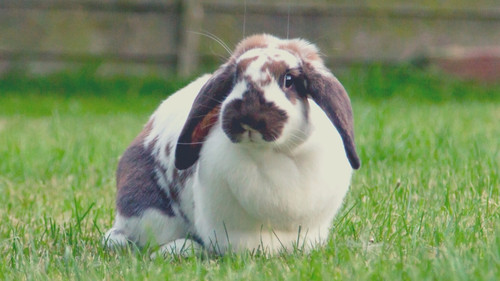
In this case, you’ll need to clean the area for them. You need to do this very carefully and gently. If you haven’t done it before, it’s best to get some guidance from your vet.
I highly recommend wearing a mask and gloves to do this, as it’s a powerful, unpleasant smell.
How to Keep a Rabbit From Smelling
Now you know that, in general, rabbits don’t smell unless there is an underlying issue. Their living area is the place that’s most likely to have an odor. You can take steps to ensure their enclosure stays as fresh as possible.
Spaying and Neutering
Both male and female rabbits are prone to spraying around their living area, although it’s more common in males.
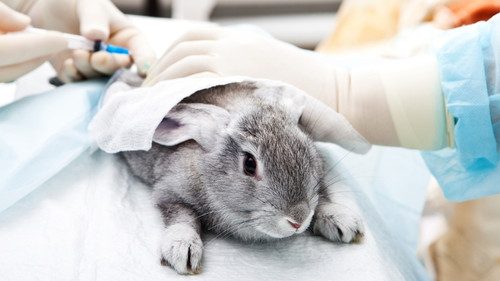
Spraying means they pee to mark their territory. Of course, this can cause a smell. Neutering or spaying your rabbit can help to stop this behavior.
Neutered rabbits are easier to litter train and are more likely to keep their enclosure clean. It’s also better for your bunny’s health and allows them to live with another bunny safely.
Litter Training
Rabbits can be litter trained, same as cats! Litter training is pretty straightforward and has many benefits. It’s more hygienic for your bunny and makes cleaning up after them much easier.
Instead of having to pick up poop and scrub pee from all over their enclosure, it’s all in one place!
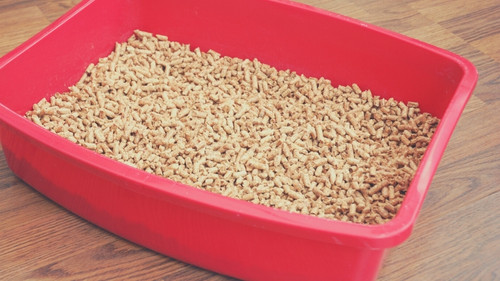
Litter training reduces the smell of your bunny’s pee as the litter absorbs the urine. Use high-quality, rabbit-safe litter for the best results.
Clean your rabbit’s litter tray daily to reduce smells and keep your home smelling nice. You can read our guide to litter training your rabbit for more information.
Cleaning Their Enclosure
If your rabbit isn’t litter trained, you should fully clean their enclosure once a day. If they’re litter trained, you should clean their litter tray daily and do a quick spot clean of their living area.
Once a week, you should fully clean their enclosure.
Thorough cleaning is essential for your rabbit’s health, as well as to reduce smells.
Use a rabbit-safe cleaner to sanitize the area thoroughly. Alternatively, some owners like to use a mix of vinegar and water.
Conclusion
Rabbits are clean animals and aren’t typically smelly. You shouldn’t struggle with odors as long as they’re healthy and you keep their living area clean. Bunnies make fantastic pets for the right owners, so don’t let worrying about a smell put you off.
Did you find this article helpful? Do you have any questions about rabbit smells? We’d love to hear what you think in the comments below.


